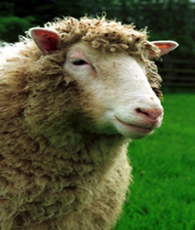Video: First Human Embryo Cloned
Triggered by the Scottish scientists’ successful cloning of a female sheep called Dolly – the first mammal to be cloned – human cloning has become a contemporary phenomenon drawing comparisons to natural creation of humans. Immediately, debates on the ethical issues about cloning and numerous researches on further social implications associated with human cloning rose. Nevertheless, many scientists and technologists advocated the “immorality” of human cloning and, therefore, research funding in the need for human cloning have been denied and blocked in many countries. Numerous misconceptions about cloning rose by the science fiction: cloned humans will exactly be the same as their genetic donors. This is not true, since, although cloned humans are born with the same genes inherited from their partners, their environments in living, their history and experiences will determine what they become in the future.

cloned dolly source :animalresearch.info
There are both advantages and disadvantages to the practice of cloning. Jessica in “The Advantages and Disadvantages in Cloning” argues that not only does cloning give benefits to modern medicine, but it also helps infertile couples and reverses the aging process of individuals. Moreover, cloning permits the study of genetic diseases and indeed genetic development more generally. Specifically, cloning could help “carriers” of X-linked and autosomal recessive disorders to have their own genetic children without risk of passing on the disease. On the other hand, human cloning is also considered as a threat to genetic diversity and evolution. Humans already destroyed the natural evolution process by inventing all kinds of medicine; people who were supposed to die by nature are still living because they can extend their life by using unnatural chemicals in which most of medicines are made of.
While most of research papers discuss the ethics and consequences of human cloning, these paper analyses how cloning can be “financially motivated” for profit. There are two types of human cloning – Therapeutic and Reproductive. Therapeutic cloning involves the production of human tissues, thus organs, while reproductive cloning produces human beings. This paper specifically focuses on reproductive cloning – cloning of humans – and how human cloning is practiced as an investment on income and technology. Two steps are discussed: cloning human beings with improved ability and using the cloned individuals for purely financial reasons.
There is an economic incentive to clone for financial purposes. For instance, it is profitable when economically valuable animals that may be worth hundreds of thousands of dollars are cloned. Moreover, if top performers in the labour market have valuable genes, then cloning them will generate a lot of financial value. This continuing process of cloning individuals with intelligent genes will lead to improvements in technology and, later on, living standards, as well.
references
Jessica. “The Advantages And Disadvantages Of Cloning.” Alternative Medicine and Natural Health. Web. 10 June 2011. <http://www.methodsofhealing.com/the-advantages-and-disadvantages-of-cloning/>
Reinhold, Sabine. “The Advantages and Disadvantages of Cloning Humans as Well as the Ethical and Social Problems Involved in It!” Research Paper (Pre-University) (2002): 1-15. Print.
Harris, John. “Goodbye Dolly?” The Ethics of Human Cloning.” Journal of Medical Ethics 23.6 (1997): 353-60. Print.




